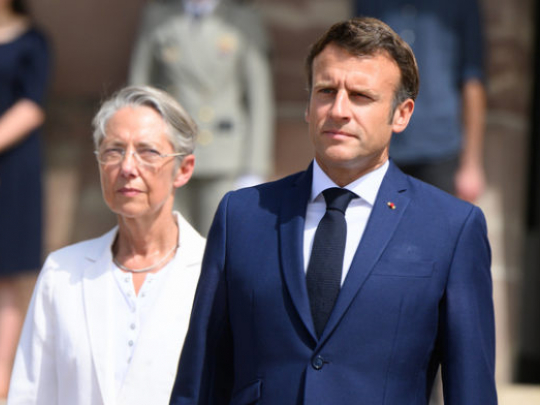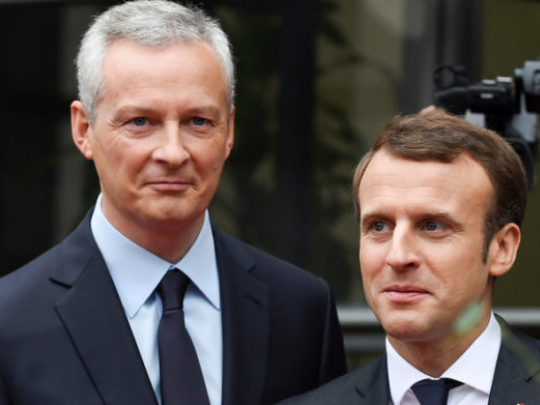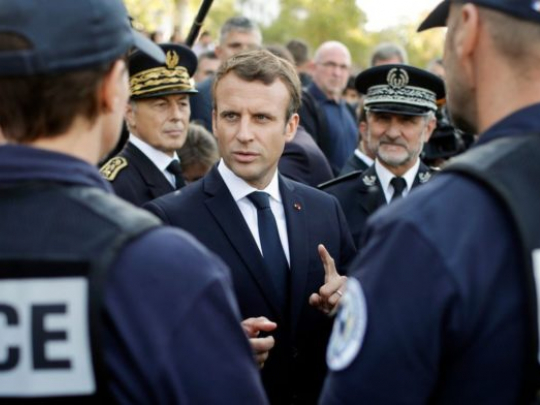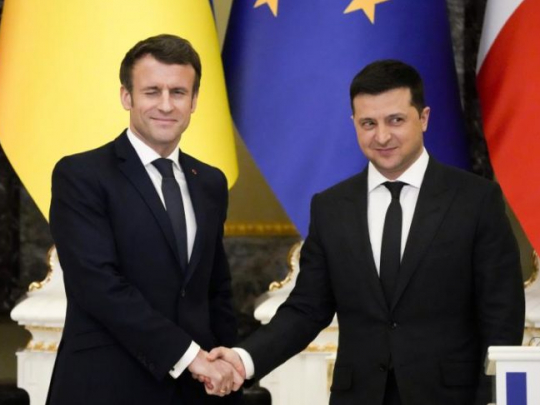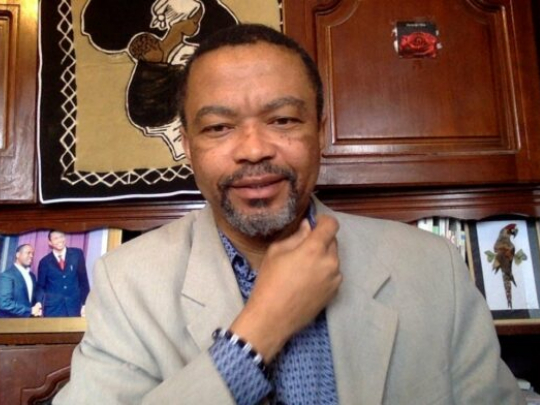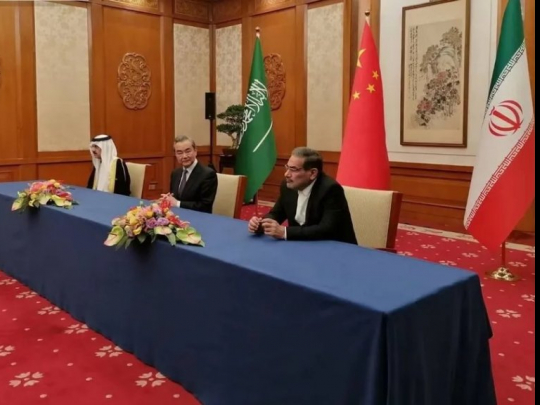War-Weary Yemenis See Threat in Israel’s Increasingly Public Role in Their Country
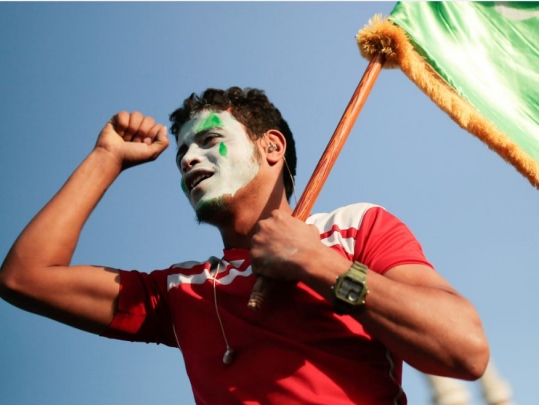
Israeli battleships now sit side by side with Emirati corvettes ominously docked in Hodeida’s territorial waters in a blatant sign of Israel’s increasingly visibly role in the Saudi-led Coalition’s half a decade long war in Yemen. The ships also represent something else to residents in Western Yemen, where a Houthi-led commemoration of Prophet Muhammad’s birthday on Thursday turned into railed a demonstration against what many see as an imminent threat to the very identity and soul of Islam, their autonomy, security, and to their brethren in Palestine.
Despite an ongoing fuel crisis, the threat of COVID-19, and one of the bloodiest wars currently raging anywhere on the planet, massive rallies took place across most of Yemen’s provinces. Protesters shouted slogans against French President Emmanuel Macron, whose public defense of cartoons mocking Islam’s holiest figure, Prophet Muhammad, under the guise of free speech is seen as hypocritical coming from a country where questioning details of the Holocaust can land someone in jail. Demonstrators, and indeed many Muslims across the region, see the events in France as hiding a more nefarious goal of dehumanizing Muslims and gutting the identity of its adherents from within.
Demonstrators carried green flags, a symbol of the Prophet Muhammad, and banners emblazoned with slogans against Macron, the Saudi coalition, and its new Israeli partners. In Yemen’s capital city of Sana’a, where the largest demonstrations took place, hundreds of thousands gathered in the southern district of Al-Sabaean. Expats from 20 countries, including Sudan, Syria, Palestine, Egypt, and Bangladesh took part in the protest. A delegation from the southern Saudi province of Najran even joined.
The events were organized primarily by the Houthis and Houthi leader Abdulmalik Al-Houthi took to the podium to give a televised address to a massive audience in which he warned that western intelligence agencies in both the United States and France were involved in supporting the same extremist Salafi interpretation of Islam that is the widely practiced in Saudi Arabia, in part to tarnish the image of the religion and to justify wars in Muslim countries.
Al-Houthi also warned that distortion and misinterpretation of Islamic teachings had created a deep rift among Muslims. “Western [countries] have used such deviation to insult the Holy Qur’an and Islam. There is no mercy or sympathy whatsoever in Western civilization. They trample on human societies, deprive people of their freedom, plunder their wealth and occupy their lands, and then lecture others on human rights,” he said.
The massive demonstrations came despite threats of violence from the very same elements that Al-Houthi warned of. In the weeks leading up to Thursday’s rallies, police implemented special measures to ensure security during proceedings, including the banning of large trucks from central Sana’a and the establishment of additional checkpoints in the Yemeni capital and other provinces.
Despite the additional security measures, Hassan Zaid, the Houthi Minister for Youth and Sports, was assassinated on Tuesday as he drove his car through Sana’a. His 11-year-old daughter was seriously injured in the attack. Zaid was one of the most influential political opponents to Saudi Arabia and was wanted by the Kingdom, which offered a $10 million bounty for information leading to his capture. Houthi security forces said that they had also thwarted dozens of other planned attacks on Thursday’s demonstration.
Israeli settlements in Yemen?
The sheer scale of this week’s demonstrations dwarfed similar rallies that have taken place in previous years, not only due to Macron’s comments in France but because of fierce opposition to Israel’s new partnership with the UAE and other wealthy Gulf states, and its increasingly active presence in Yemen.
Yemenis fear that Israel not only seeks control of the strategic Bab-el-Mandeb strait, efforts that MintPress has covered in previous months, but also that it seeks a permanent footprint inside of Yemen and hopes to replace the original inhabitants of the islands and other coastal cities with Israeli settlers in a move reminiscent of the land grabs that led to the eventual annexation of land in what is now Israel.
In October, Houthi spokesman Yahya Saree warned that Israel was planning to naturalize tens of thousands of Yemeni-born Jews, emphasizing that such a scenario posed a grave threat to Yemen’s national security. Saree presented a number of National Security Agency documents that were seized when the Houthis took control from the government of former President Ali Abdullah Saleh, who ruled Yemen for 33 years.
Those documents detailed visits by Israeli officials to Yemen, facilitated by the UAE, in which a number of economic, cultural, and agricultural agreements were brokered alongside an agreement to open Yemeni airspace to Israeli aircraft. The most dangerous documents, according to Saree, relate to “the modernization of the Yemeni military forces.”
According to the documents, Israeli diplomat Bruce Kashdan arrived in Sana’a on an unannounced visit on July 14 of 2007, which lasted 48 hours. During that trip, Kashdan met with Yemeni military and security top brass who are relatives of Saleh. The Israeli official left Sana’a International Airport on July 16, 2007. The visit had been arranged by Yemeni officials in collaboration with the United Arab Emirates. Kashdan, who was also serving as a coordinator of relations between Tel Aviv and Dubai at that time, had also visited Yemen on February 2, 2005.
A delegation from the Israeli Knesset also visited Sana’a in March 1996 and received remarkable hospitality given the Yemeni government’s official stance towards Israel at the time. Knesset members met with several senior security and civilian officials headed by former president Saleh. Many Israeli delegations visited Yemen between 1995 and 2000 under the cover of tourism, commerce, and investment, according to the National Security Agency documents.
Saree accused the UAE and Israel of reviving a project that granted Israeli citizenship to more than 60,000 Yemenis. According to a memorandum to the UAE’s foreign minister in 2004 by Hamad Saeed Al-Zaabi, the Emirati ambassador in Sana’a, an Israeli delegation visited the Yemeni capital as part of normalization efforts and presented demands to build a museum celebrating Yemeni Jews in Sana’a among other moves that included naturalizing 45,000 Yemeni Jews as Israeli citizens. The Emirati ambassador described the move as part of a broader effort being pushed by the United States.
- Source : Ahmed Abdulkareem




